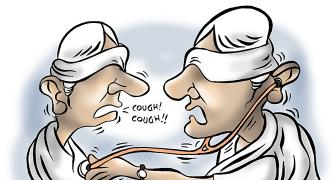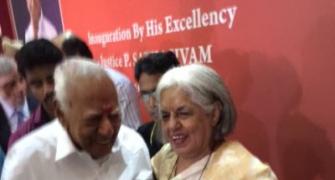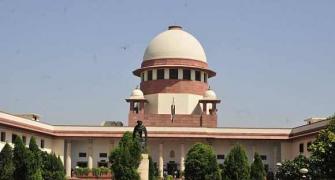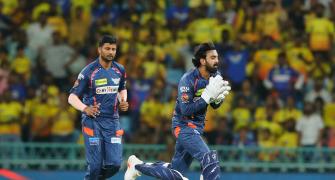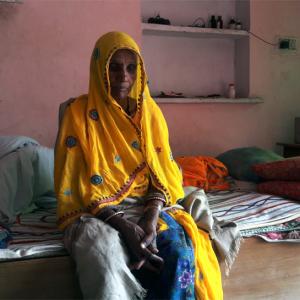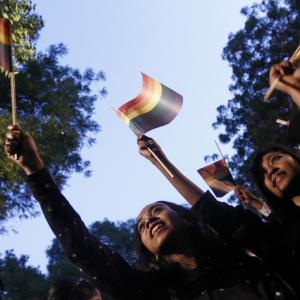'I do feel it's a question of your own upbringing, the way your father treats your mother, how the daughters are treated in the house.'
'You learn so much by osmosis. I suppose it's getting better, but it's not gone.'
'It's still a patriarchal society.'
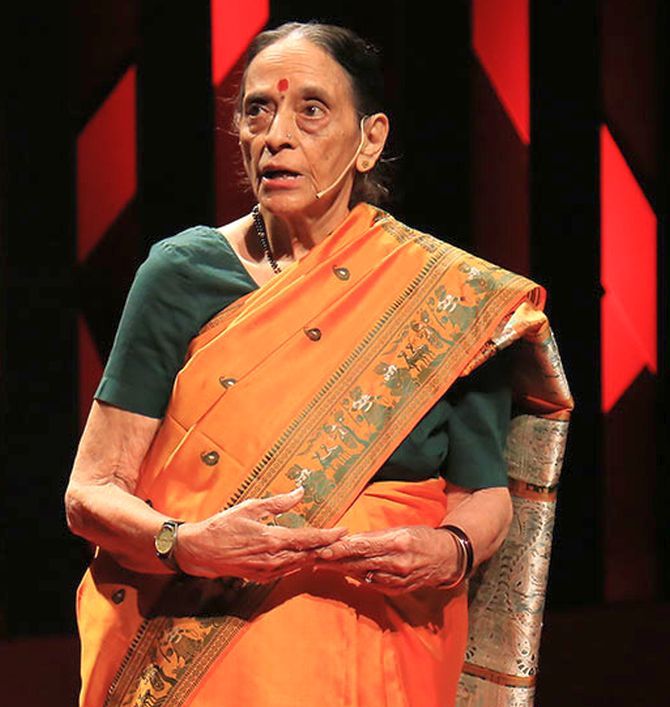
Justice Leila Seth, who passed into the ages on May 5, was a legal legend.
The first lady chief justice of the Delhi high court reflected on her career as lawyer and judge in this fascinating interview with Pallavi Saluja, for the legal portal, Bar and Bench.
Why did you take up law?
It was a very mundane reason. I had gone to England with my husband, and I found that law was one of the few things you could do without attending classes!
I had no one in the family who did law and I didn't have a particular interest. But once I started doing it, I did quite well.
I wanted to be a teacher and had done a course in Montessori training and I thought I'd come back to India and set up a small Montessori school.
But once I did well at the Bar, everybody said that I must practise.
Tell us about your initial years.
So in Calcutta, I looked to train under the best lawyer in the city, and narrowed it down to Sachin Chaudhary.
When I met him, he tried to dissuade me by saying that the law is not a profession for women.
He told me in a gruff voice, 'Young woman, instead of joining the legal profession, you should go get married.'
So I said that I was already married.
'Then go and have a child,' he said.
I told him that I already had a child.
He then said that it was very selfish to have only one child and that I should go and have a second child.
So I told him I have two children! (laughs)
Taken aback, he said, 'Come and join my chambers. You're persistent and you'll do well at the Bar!'
How was it working in Calcutta and Patna in those days?
It was especially difficult in Patna. There was just one other female advocate.
Bihar being what it is, when I used to go to the mofussil areas to practise, the crowd would gather and say, 'Aurat vakil aayi hai. (A woman lawyer has come).'
But that was true not only of Patna, but also of Delhi.
When I became a judge at the Delhi high court, Charan Singh was the prime minister and he had invited a lot of his constituents to visit Delhi.
One day, I was sitting in court and suddenly I saw a huge crowd.
I asked my peshkar if there was some famous case being heard. He said: 'No, madam. They came to see the zoo. They heard that there's a woman judge at the Delhi high court, so they've come to see you.'
Initially, it was difficult as a lawyer, because everybody thought I wouldn't stay.
I stayed away from women's issues; I didn't want to be known as a woman lawyer doing divorce and custody cases.
So I especially looked for income tax, commercial law, contracts cases.
I wanted to prove myself in the mainstream.
When I was in Calcutta, I was given a brief to write an opinion.
I sent the opinion, but never got my fees.
After about three months, I met him (the person who brought the brief) at a party and he came up to me and said, 'I don't know whether to tell you this or not, but after we got your opinion, we sent it to the client. And the client said that he wanted a male opinion. I told my client that she was a very competent young woman, so there's no question of male or female.'
The client sent the brief to the senior-most lawyer in the Calcutta high court, who returned the opinion with only one line: 'I endorse the opinion of Leila Seth.'
And the client was happy because they got their male opinion, even though they had to pay 10 times the fee.
So that was the attitude back then, they didn't trust women to do a good job.
How did judgeship come about?
I had been practising in the Delhi high court and the Supreme Court for five to six years.
I think it was also at that time when they were anxious to have women on the Bench.
So the then chief justice of the Delhi high court T V R Tatachari asked me to join and I agreed; the custom back then was that when you are offered judgeship, you don't refuse.
Nowadays, a lot of people refuse because for men it's much more difficult, as they have to look after their families.
Being the first woman judge of the Delhi high court, I got a lot of publicity!
What was it like to be the only woman on the Bench?
It was strange.
Whenever my colleagues introduced me they would say, 'Meet our new woman judge.'
I told them that I didn't introduce them as 'gentlemen judges' or something like that.
When I joined they told me, 'Now you can organise our parties!' I said, 'Certainly not! Whoever was organising them earlier would continue.'
They sort of took it for granted that because I was a woman, I would do all these things.
As far as the judicial side was concerned, I never felt singled out.
Except with Chief Justice Tatachari.
Normally, when you join the Bench, you start off by sitting with the chief justice. But he refused to sit with me as it meant not only being together in court, but also being alone in closed chambers for discussion because he was very conservative.
He always had this huge teeka on his forehead. But the second senior-most judge who I sat with, Justice Prakash Narain, was much more open.
In your book, you've written on gender sensitisation of the judiciary. Do you see judges treating men and women equally?
Not at all.
Especially in rape cases, the lower judiciary has a slightly different attitude.
You could see that in the Bhanwari Devi case; the lower judiciary felt she couldn't have been raped by upper class and respectable middle class men.
When it comes to the higher judiciary, they are much more understanding of the victim's position.
I found that the judges who had daughters were much more understanding -- for example, Justice J S Verma and Justice Anand.
I do feel it's a question of your own upbringing, the way your father treats your mother, how the daughters are treated in the house.
You learn so much by osmosis. I suppose it's getting better, but it's not gone.
It's still a patriarchal society.
On the Section 377 judgment of the Supreme Court, you wrote, 'The judgment has treated people with a different sexual orientation as if they were people of lesser value.'
The judgment of the Delhi high court was very creative, and the Supreme Court said that it was just a few people.
They don't understand that it affected probably five per cent of the population.
They are not doing anything wrong, and in fact they are not coming out as they're afraid.
They are even afraid to come out to their parents.
Sometimes, the parents think that they will get 'cured' by getting married, which results in difficult marriages.
If Section 377 is treated as the Delhi high court treated it, things would be on an even keel.
People would come out, parents would stop pushing them to doctors or some kind of magicians, and people can lead a more normal life.
The people I know who have come out are extremely nice human beings, why treat them as criminals?
Sexual orientation should not be grounds for discrimination.
How did you deal with your son's coming out?
The first time I got to know, I wasn't familiar with the whole idea.
I love my son (Vikram Seth, the celebrated writer) and thought he wasn't doing anything wrong, and he was bisexual, so I just accepted it.
But I was afraid for him; somebody could have made a case against him because it is a criminal act, so I was worried.
I mentioned it in my book. He said, 'Put it in, it will give courage to other parents.'
It's a brief paragraph, but it describes how it is difficult to accept in the beginning, but how you must.
And you will lose them if you dont accept it.
Edited excerpts from one of the last interviews with the late Justice Leila Seth, by Pallavi Saluja of the legal portal, Bar and Bench. The interview was conducted in June 2015.


